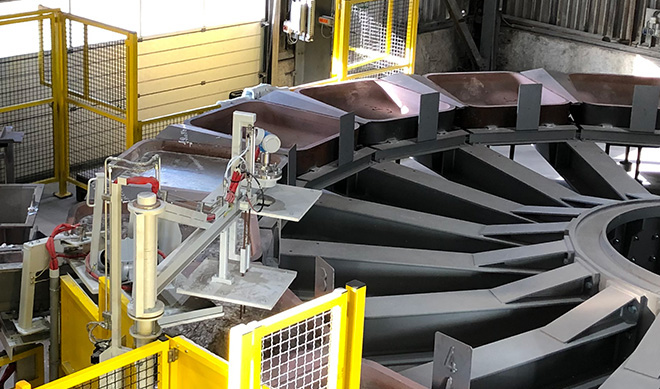
Trimet Aluminium SE expanded its production capacity for aluminum sows with the installation of a new casting machine at its smelter in Hamburg, Germany. The facility can now cast around 45,000 tonnes of the aluminum sows — almost doubling capacity.
“The new casting machine allows us to respond even more flexibly to our customers’ needs and we are now in a position to adapt better to the fluctuating requirements of the market,” said Dr. Andreas Lützerath, a member of the executive board at Trimet.
The new machine features a casting carousel with 18 molds, enabling it to cast 18 sows every two hours. Each sow weighs 780 kg. The machine provides a high technical standard that guarantees consistently excellent product quality.
In addition to increasing production output and providing high quality, the new casting machine also improves occupational health and safety at the Hamburg facility. Every stage of the process is automated — from casting and skimming to labeling and weighing the sows, to depositing them on a conveyor belt. Robots thus perform work that previously had to be done by hand.
New Automotive Alloy
Trimet has developed a new aluminum alloy for high pressure die casting of automotive components. The trimal®-38 (AlSi8ZnMn) high pressure die cast alloy broadens the company’s range of materials to meet increasing material requirements in automotive construction and open up new application areas for light metal.
“Modern vehicle construction offers new application options for aluminum as a material,” said Thomas Reuther, a member of the executive board at Trimet. “The goal of achieving ever reduced weight while simultaneously maintaining mechanical properties makes very high demands on material design. We have succeeded in mastering this balancing act with our new alloys.”
The new trimal®-38 high pressure die casting alloy achieves excellent castability and ductility during manufacture of large die cast structural components. Despite its low silicon content (a maximum 8.5%), the new alloy can be cast using the production process parameters as the widespread trimal®-37 (AlSi9Mn) alloy, thus facilitating quick alloy changes. Other alloy elements optimize its flowability, strength, and die filling ability, while simultaneously minimizing the adhesion tendency of the material.
The trimal®-38 alloy is also extremely resistant to corrosion. Limitation of magnesium content to a maximum of 0.01% means that the material need not be heat treated to achieve the desired mechanical properties. The new alloy is particularly suitable for components in electric vehicles, such as battery housings or structural components that must withstand crash load conditions without heat treatment and are joined through welding or with self-piercing rivets.
